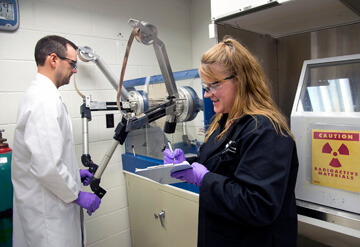Did You Know?: Nuclear Pharmacy Lab
February 21, 2014
 |
|
Andrew Day, a third-year pharmacy student, and Kara Duncan-Weatherman, clinical associate professor of pharmacy practice, in the Nuclear Pharmacy Lab. (Purdue University photo/Mark Simons) |
Compounding radioactive drugs is just another day's work for students and faculty working in Purdue's Nuclear Pharmacy Lab.
Located in Hampton Hall, Room 1293/1294, the Nuclear Pharmacy Lab is home to safety radiation equipment that identifies, localizes and quantifies the amount of radioactivity present. The Nuclear Pharmacy Lab is used mostly by students enrolled in the College of Pharmacy professional program as they work toward completing 200 didactic training hours needed to become an authorized nuclear pharmacist. Purdue is one of five universities in the United States whose college of pharmacy offers specialized courses for nuclear pharmacy as part of its professional program.
"We let the students handle radioactive materials," says Kara Duncan-Weatherman, clinical associate professor of pharmacy practice. "A lot of training programs talk theory, so we are lucky because we have strong relationships with several corporate partners that provide donations of products and equipment that allow our students to pretty much replicate what they would do on a day-to-day basis in a nuclear pharmacy."
Unlike most retail pharmacies, the nation's 420-plus nuclear pharmacies put FDA-approved amounts of radioactivity in the body by combining it with FDA-approved drugs to trace radioactive emissions through the body. Among the functions that these emissions show are the metastasis of cancer to the bones, the flow of blood to the heart and the functions of the kidneys. The drug with which the radioactivity is compounded determines the path the radioactivity will take once in the body.
"Nuclear pharmacists are licensed pharmacists -- they do the same compounding and dispensing functions that pharmacists at a community pharmacy or a hospital would do," Duncan-Weatherman says. "Nuclear pharmacists actually dispense prescription doses for patients; they just happen to be radioactive."
In addition to undergraduate work, the nuclear pharmacy program also offers postgraduates the opportunity to complete 200 hours toward their nuclear pharmacist certifications. Between 30 and 40 postgraduates enroll in the program each year. Small-scale research is also conducted in the lab by faculty, staff and students.
As a result of World War II and the increased interest in the use of nuclear materials for research purposes, classes that focused on nuclear materials were first offered at Purdue in the 1940s. It was not until the early 1970s, however, that courses were offered that focused on teaching pharmacy students about radioactive pharmaceuticals. Stanley Shaw, professor emeritus of nuclear pharmacy, cultivated the nuclear pharmacy program at Purdue to make it one of the top programs in the United States.
"We're a very unique little niche in the world of pharmacy, which we are very proud of here," Duncan-Weatherman says.
Writer: Hannah Harper, harper4@purdue.edu
